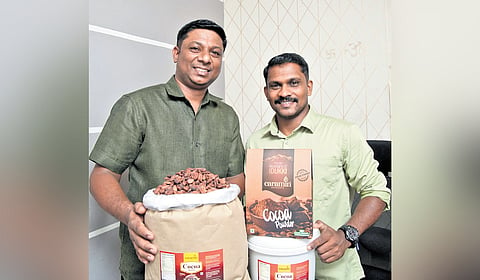

KOCHI: M C Saju, a small farmer who grows cocoa on a four-acre plot at Koothattukulam in Ernakulam district, has spread nets on the ground beneath each cocoa tree to ensure not a single bean is lost after the squirrels spit them.
“The squirrels only suck out the sweet flesh. One bean fetches Rs 1 at the current price,” he says. According to him, 1,000 cocoa beans would come to nearly 1,100 grams. “That’s Rs 1,000 plus.”
While the price of dry cocoa beans rose by more than 200% from Rs 325/kg in January to Rs 1,020/kg last week, the price of wet beans increased from Rs 85/kg to nearly Rs 400/kg, a whopping rise of 375% in four months. The sharp increase in international cocoa prices is attributed to a collapse in production in west African countries, like Ivory Coast and Ghana, which account for 60% of global production.
For Ajit T T, the chief marketing officer of Caramin Extracts, a small cocoa-processing unit based in Chelachuvadu near Cheruthoni in Idukki district, the situation is entirely different. The company procures cocoa from a group of 200 farmers spread across the panchayats of Murickassery, Kanjikuzhy and Vathikudy.
“Every Monday we go to their homes, collect the fresh beans and give them the most premium price. We dry the beans, process them and turn them into chocolate ingredients before selling them to chocolate manufacturers. With the sharp rise in cocoa prices, there is a possibility of lower demand from chocolate companies,” reckons Ajit.
If the situation persists, he believes chocolate makers will have to either increase prices or slow down cocoa purchases. “But the good thing now is that there is enough demand within the country that I don’t see any slowdown in cocoa procurement,” he adds.
His company has the capacity to process 5,000 kg of cocoa beans a month.
“After the increase in prices, we have seen farmers taking good care of cocoa trees by pruning the leaves, protecting the fruits and watering the plants. This could result in at least a 40% increase in production,” Ajit says.
K J Varghese, president of the Cocoa Producers’ Cooperative Society in Manimala, Kottayam, says he sold five tonnes to Mumbai-based Morde Food Products when the price touched Rs 700/kg. He sold another tonne at Rs 1,000/per kg.
“Yes, the going has been good this year,” says Varghese.
Cocoa farmers like Saju have never had it so good since the price boom of the early 1980s, when farmers in Kerala, mostly in Idukki, jumped into cocoa cultivation in large numbers buoyed by the sharp increase in prices. But it turned out to be a bitter experience for them as the prices collapsed soon, forcing many to destroy the crop and return to rubber. This time, Saju does not foresee a similar scenario, at least not in the immediate future even as most farmers are just watching from the sidelines. They are like “once bitten, twice shy”, he says.
“When the prices touched Rs 300/kg, the small farmers sold their stocks. Then the prices went past Rs 500/kg and now it’s gone past Rs 1,000/kg. I’m now selling cocoa daily. You don’t know how long the party lasts,” he says.
Indian chocolate makers like Morde Foods, Jindal Cocoa and Ambriona are the biggest buyers of cocoa and its substitutes. Industry officials reckon there won’t be any slowdown in demand in the near future as the supplies from Ghana and Ivory Coast will take time to return to normal. Ajit’s Caramin Extracts supplies beans, roasted shell, cocoa liquor, cocoa butter and cocoa powder to chocolate makers.
According to the first advance estimate of the Kochi-based Directorate of Cashewnut and Cocoa Development, the cocoa production by Kerala grew marginally to 10,535 tonnes in 2023-24 from 10,533 in the preceding year.
During the same period, the area of cocoa production increased from 18,233 hectares to 18,458 hectares. Though the increase in production may seem marginal (just 2 tonnes a year), the picture is different on a three-year perspective when the prices slowly started to climb. In 2020-21, the cocoa production in Kerala stood at 9,647 tonnes, meaning it grew by 888 tonnes or nearly 10% in three years.